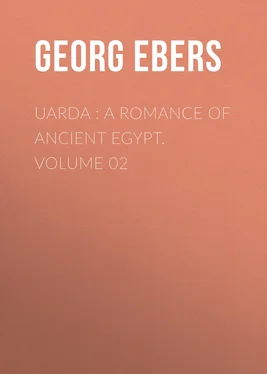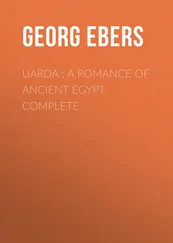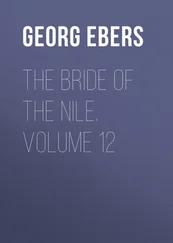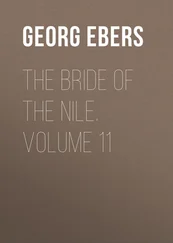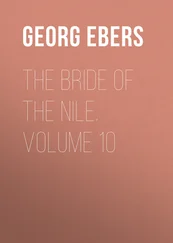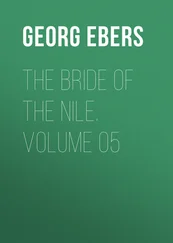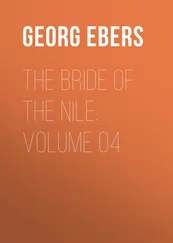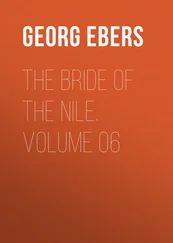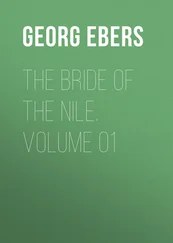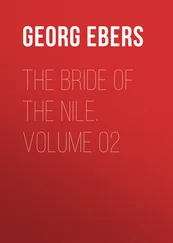Georg Ebers - Uarda - a Romance of Ancient Egypt. Volume 02
Здесь есть возможность читать онлайн «Georg Ebers - Uarda - a Romance of Ancient Egypt. Volume 02» — ознакомительный отрывок электронной книги совершенно бесплатно, а после прочтения отрывка купить полную версию. В некоторых случаях можно слушать аудио, скачать через торрент в формате fb2 и присутствует краткое содержание. Жанр: Альтернативная история, literature_19, foreign_antique, foreign_prose, Исторические приключения, на английском языке. Описание произведения, (предисловие) а так же отзывы посетителей доступны на портале библиотеки ЛибКат.
- Название:Uarda : a Romance of Ancient Egypt. Volume 02
- Автор:
- Жанр:
- Год:неизвестен
- ISBN:нет данных
- Рейтинг книги:4 / 5. Голосов: 1
-
Избранное:Добавить в избранное
- Отзывы:
-
Ваша оценка:
- 80
- 1
- 2
- 3
- 4
- 5
Uarda : a Romance of Ancient Egypt. Volume 02: краткое содержание, описание и аннотация
Предлагаем к чтению аннотацию, описание, краткое содержание или предисловие (зависит от того, что написал сам автор книги «Uarda : a Romance of Ancient Egypt. Volume 02»). Если вы не нашли необходимую информацию о книге — напишите в комментариях, мы постараемся отыскать её.
Uarda : a Romance of Ancient Egypt. Volume 02 — читать онлайн ознакомительный отрывок
Ниже представлен текст книги, разбитый по страницам. Система сохранения места последней прочитанной страницы, позволяет с удобством читать онлайн бесплатно книгу «Uarda : a Romance of Ancient Egypt. Volume 02», без необходимости каждый раз заново искать на чём Вы остановились. Поставьте закладку, и сможете в любой момент перейти на страницу, на которой закончили чтение.
Интервал:
Закладка:
Georg Ebers
Uarda : a Romance of Ancient Egypt – Volume 02
CHAPTER V
The night during which the Princess Bent-Anat and her followers had knocked at the gate of the House of Seti was past.
The fruitful freshness of the dawn gave way to the heat, which began to pour down from the deep blue cloudless vault of heaven. The eye could no longer gaze at the mighty globe of light whose rays pierced the fine white dust which hung over the declivity of the hills that enclosed the city of the dead on the west. The limestone rocks showed with blinding clearness, the atmosphere quivered as if heated over a flame; each minute the shadows grew shorter and their outlines sharper.
All the beasts which we saw peopling the Necropolis in the evening had now withdrawn into their lurking places; only man defied the heat of the summer day. Undisturbed he accomplished his daily work, and only laid his tools aside for a moment, with a sigh, when a cooling breath blew across the overflowing stream and fanned his brow.
The harbor or clock where those landed who crossed from eastern Thebes was crowded with barks and boats waiting to return.
The crews of rowers and steersmen who were attached to priestly brotherhoods or noble houses, were enjoying a rest till the parties they had brought across the Nile drew towards them again in long processions.
Under a wide-spreading sycamore a vendor of eatables, spirituous drinks, and acids for cooling the water, had set up his stall, and close to him, a crowd of boatmen, and drivers shouted and disputed as they passed the time in eager games at morra.
[In Latin "micare digitis." A game still constantly played in the south of Europe, and frequently represented by the Egyptians. The games depicted in the monuments are collected by Minutoli, in the Leipziger Illustrirte Zeitung, 1852.]
Many sailors lay on the decks of the vessels, others on the shore; here in the thin shade of a palm tree, there in the full blaze of the sun, from those burning rays they protected themselves by spreading the cotton cloths, which served them for cloaks, over their faces.
Between the sleepers passed bondmen and slaves, brown and black, in long files one behind the other, bending under the weight of heavy burdens, which had to be conveyed to their destination at the temples for sacrifice, or to the dealers in various wares. Builders dragged blocks of stone, which had come from the quarries of Chennu and Suan,
[The Syene of the Greeks, non, called Assouan at the first cataract.]
on sledges to the site of a new temple; laborers poured water under the runners, that the heavily loaded and dried wood should not take fire.
All these working men were driven with sticks by their overseers, and sang at their labor; but the voices of the leaders sounded muffled and hoarse, though, when after their frugal meal they enjoyed an hour of repose, they might be heard loud enough. Their parched throats refused to sing in the noontide of their labor.
Thick clouds of gnats followed these tormented gangs, who with dull and spirit-broken endurance suffered alike the stings of the insects and the blows of their driver. The gnats pursued them to the very heart of the City of the dead, where they joined themselves to the flies and wasps, which swarmed in countless crowds around the slaughter houses, cooks' shops, stalls of fried fish, and booths of meat, vegetable, honey, cakes and drinks, which were doing a brisk business in spite of the noontide heat and the oppressive atmosphere heated and filled with a mixture of odors.
The nearer one got to the Libyan frontier, the quieter it became, and the silence of death reigned in the broad north-west valley, where in the southern slope the father of the reigning king had caused his tomb to be hewn, and where the stone-mason of the Pharaoh had prepared a rock tomb for him.
A newly made road led into this rocky gorge, whose steep yellow and brown walls seemed scorched by the sun in many blackened spots, and looked like a ghostly array of shades that had risen from the tombs in the night and remained there.
At the entrance of this valley some blocks of stone formed a sort of doorway, and through this, indifferent to the heat of day, a small but brilliant troop of the men was passing.
Four slender youths as staff bearers led the procession, each clothed only with an apron and a flowing head-cloth of gold brocade; the mid-day sun played on their smooth, moist, red-brown skins, and their supple naked feet hardly stirred the stones on the road.
Behind them followed an elegant, two-wheeled chariot, with two prancing brown horses bearing tufts of red and blue feathers on their noble heads, and seeming by the bearing of their arched necks and flowing tails to express their pride in the gorgeous housings, richly embroidered in silver, purple, and blue and golden ornaments, which they wore—and even more in their beautiful, royal charioteer, Bent-Anat, the daughter of Rameses, at whose lightest word they pricked their ears, and whose little hand guided them with a scarcely perceptible touch.
Two young men dressed like the other runners followed the chariot, and kept the rays of the sun off the face of their mistress with large fans of snow-white ostrich feathers fastened to long wands.
By the side of Bent-Anat, so long as the road was wide enough to allow of it, was carried Nefert, the wife of Mena, in her gilt litter, borne by eight tawny bearers, who, running with a swift and equally measured step, did not remain far behind the trotting horses of the princess and her fan-bearers.
Both the women, whom we now see for the first time in daylight, were of remarkable but altogether different beauty.
The wife of Mena had preserved the appearance of a maiden; her large almond-shaped eyes had a dreamy surprised look out from under her long eyelashes, and her figure of hardly the middle-height had acquired a little stoutness without losing its youthful grace. No drop of foreign blood flowed in her veins, as could be seen in the color of her skin, which was of that fresh and equal line which holds a medium between golden yellow and bronze brown—and which to this day is so charming in the maidens of Abyssinia—in her straight nose, her well-formed brow, in her smooth but thick black hair, and in the fineness of her hands and feet, which were ornamented with circles of gold.
The maiden princess next to her had hardly reached her nineteenth year, and yet something of a womanly self-consciousness betrayed itself in her demeanor. Her stature was by almost a head taller than that of her friend, her skin was fairer, her blue eyes kind and frank, without tricks of glance, but clear and honest, her profile was noble but sharply cut, and resembled that of her father, as a landscape in the mild and softening light of the moon resembles the same landscape in the broad clear light of day. The scarcely perceptible aquiline of her nose, she inherited from her Semitic ancestors,
[Many portraits have come down to us of Rameses: the finest is the noble statue preserved at Turin. A likeness has been detected between its profile, with its slightly aquiline nose, and that of Napoleon I.]
as well as the slightly waving abundance of her brown hair, over which she wore a blue and white striped silk kerchief; its carefully-pleated folds were held in place by a gold ring, from which in front a horned urarus
[A venomous Egyptian serpent which was adopted as the symbol of sovereign power, in consequence of its swift effects for life or death. It is never wanting to the diadem of the Pharaohs.]
raised its head crowned with a disk of rubies. From her left temple a large tress, plaited with gold thread, hung down to her waist, the sign of her royal birth. She wore a purple dress of fine, almost transparent stuff, that was confined with a gold belt and straps. Round her throat was fastened a necklace like a collar, made of pearls and costly stones, and hanging low down on her well-formed bosom.
Читать дальшеИнтервал:
Закладка:
Похожие книги на «Uarda : a Romance of Ancient Egypt. Volume 02»
Представляем Вашему вниманию похожие книги на «Uarda : a Romance of Ancient Egypt. Volume 02» списком для выбора. Мы отобрали схожую по названию и смыслу литературу в надежде предоставить читателям больше вариантов отыскать новые, интересные, ещё непрочитанные произведения.
Обсуждение, отзывы о книге «Uarda : a Romance of Ancient Egypt. Volume 02» и просто собственные мнения читателей. Оставьте ваши комментарии, напишите, что Вы думаете о произведении, его смысле или главных героях. Укажите что конкретно понравилось, а что нет, и почему Вы так считаете.
